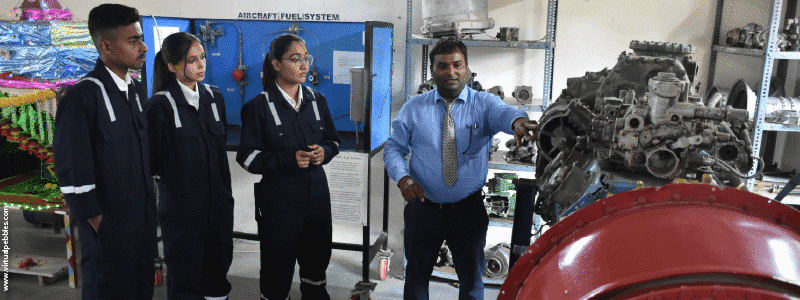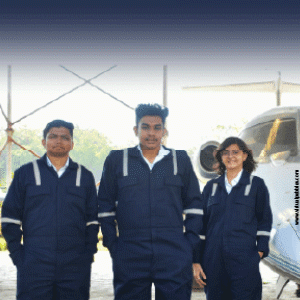
Aircraft maintenance engineering is not a degree nor a diploma course; instead, it is a licensing course. The Directorate General of Civil Aviation (DGCA) provides a certificate as a licenced aircraft maintenance engineer. Before the flight takes off, the aviation maintenance experts inspect the aircraft to verify that all systems are in proper working order. Aircraft maintenance engineering graduates are responsible for ensuring aircraft safety, and they play an essential part in the aviation industry. Mechanical and avionics are the two streams this course may be subdivided, respectively.
Aircraft maintenance, upgrades, and quality assurance are all included in this field of expertise. The Directorate General of Civil Aviation has authorised a four-year aircraft maintenance engineering programme taught in a classroom setting (DGCA). After completing their aircraft maintenance engineering degree, engineers can find employment in the aviation industry, either government or private. It is taught how to design and build aeroplanes from the ground up.

The category that deals with the learning and maintenance of jet engines and aeroplane structures are commonly referred to as the Category of Aircraft Maintenance Engineering B1.1 in the (Aeroplane Turbine category). B1.1 (Aeroplane Turbine) category students who pass all of the Basic Knowledge Module Examination conducted by the Directorate General of Civil Aviation (DGCA) and complete all of the maintenance experience requirements specified by the DGCA in Aircraft Rule 61 and Civil Aviation Regulation 66 are awarded the Aircraft Maintenance Engineering License in the B1.1 (Aeroplane Turbine) category.
By obtaining a B1.1 (Aeroplane Turbine) category Aircraft Maintenance Engineering licence, the holder of this licence is authorised to exercise its power to carry out maintenance on aircraft structure, power-plant, mechanical, and electrical systems in respect of an aircraft type endorsed on the Aircraft Maintenance Engineer licence, as well as to act as support staff following the maintenance performed on the aircraft structure, power-plant, mechanical, and electrical systems. Developed in accordance with the Aviation Industry Standard and authorised by the Director-General of Civil Aviation, the course content meets all requirements (DGCA).
Aircraft Maintenance Engineering is a category within the B2 (Avionics) classification that provides access to current aircraft expertise. The Aircraft Maintenance Engineering licence given by the Director-General of Civil Aviation (DGCA) of the Government of India is a balanced, practical and theory-based approach to repairing aircraft. Maintaining the existing aircraft in airworthy condition is impossible to achieve without the technical expertise and dedication of Aircraft Maintenance Engineers. They are primarily responsible for maintaining the plane's airworthiness and issuing its airworthiness certificate before the flight.
They work with various clients, including airlines, aero-engine manufacturers' maintenance departments, and government-sponsored aircraft maintenance companies. After performing maintenance on avionic and electrical procedures and avionic and electrical systems, the licence holder issues discharge certificates to the service.

Category B1.1 (Aeroplane Turbine) -The licence holder is authorised to issue certificates of release to service following the completion of maintenance on an aircraft's structure, turbine engine, mechanical and electrical systems, and work on an aircraft's avionics system that requires only simple tests to demonstrate serviceability and does not necessitate troubleshooting, in respect of an aircraft type endorsed on the licence.
To be eligible for a category B1 licence, an applicant must have performed a specified amount of aviation repair work. This experience must be related to the licence category required and aviation maintenance experience gained through aircraft operation. This expertise should include the maintenance of the aircraft structure, powerplant, mechanical and electrical systems, and the replacement of avionic LRUs requiring only simple tests to demonstrate their serviceability. In addition, candidates should have at least four years of hands-on experience performing maintenance on aircraft in operation.
Category B2 (Avionics) - The licence holder is authorised to issue certificates of release to service following maintenance on avionic and electrical systems, avionic and electrical systems within an engine and mechanical systems, and avionic and electrical systems within a machine and mechanical systems that require only simple tests to demonstrate their suitability for the aircraft type endorsed on the licence.

Requirements for obtaining an Aircraft Maintenance Engineering Licence in the B2 Category based on prior experience
An applicant for a category B2 Aircraft Maintenance Engineering licence should have completed a prescribed length of aircraft maintenance experience before being considered for the licence. This experience must be related to the licence category sought, as well as to aircraft maintenance experience in avionics and electrical systems, and it must have occurred while operating an aircraft. Applicants for the Category B2 position should have four years of hands-on experience performing maintenance on aircraft in operation.

Civil Aviation is authorized by the Directorate General of Civil Aviation, which is responsible mainly for safety problems in Civil Aviation. It regulates air transportation services to, from, and within India and enforces civil aviation legislation, air safety requirements, and aircraft airworthiness standards. It also works closely with the International Civil Aviation Organization to coordinate all regulatory duties.
A module is a collection of subjects that students must study to understand an aircraft and its systems. According to the DGCA, there are 17 modules. Applicants must pass the modules that correspond to the category that they chose. For example, to get a License in Category B1.1, the student must pass 11 modules administered by the Directorate General of Civil Aviation.
An aircraft can't take off until the certification of release to service (CRS) has been given by the certifying staff on behalf of the CAR-145 approved maintenance organisation (AMO), which has completed all maintenance necessary by the aircraft customer, operator, or owner. In addition, to advance in aircraft maintenance engineering, one must obtain a licence granted by the Regulatory Authority, Director General of Civil Aviation, in accordance with Aircraft Rule 61 and Civil Aviation Regulation 66.
Modules are the subjects that students must study to understand an aircraft and its systems thoroughly. According to the DGCA, there are 17 modules; however, candidates must pass the modules that correspond to their selected category (e.g. for Category B2 license, a student needs to clear 10 nos. of modules). In addition, the candidate must pass the Module examination administered by the Director-General of Civil Aviation, Ministry of Civil Aviation, Government of India, to be considered.

Western India Institute of Aeronautics Pvt. Ltd. (WIIA) has been developing rapidly since 2004 and is acknowledged as one of India's finest Institutes of Aviation courses. WIIA offers an Aircraft Maintenance Engineering course that has been authorised by the Directorate General of Civil Aviation (DGCA), Ministry of Civil Aviation, Government of India, and other skill development courses in the Aviation area using cutting-edge technology and systems. WIIA also provides a B.Sc (Honours) in Aircraft Maintenance in collaboration with Indus University.
WIIA students are taught the information and skills needed to excel in the aviation business by a group of highly qualified and experienced industry specialists. Our Institute's faculty strives to give students high-quality education and learning opportunities. WIIA is India's only Aviation Institute with its own Boeing 737-200 aircraft on-site to provide students with the most significant academic and practical expertise. WIIA believes that a student who is industry-ready creates a beautiful professional. We provide our teaching laboratories with the most up-to-date equipment, technologies, and techniques required for realistic field maintenance of various aircraft types.